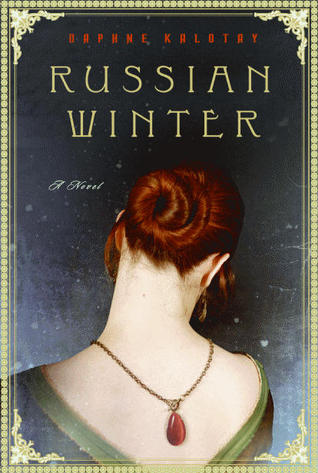"But isn't it funny, that in some ways the price one pays for freedom of speech is ... a kind of indifference."
I'm a big fan of learning about history via historical fiction. I took more history classes in high school than anything else, mostly because of a brilliant teacher, and it left me with a desire to know more things about what preceded me. However, I tend to sleep through drier, more accurate, non-fiction accounts of events, even of things that were incredibly interesting. Give me some characters to care about, even if they never existed, and I'll absorb way more about the period than I would have otherwise. As such, Russian Winter was a great way for me to learn more about Stalin's Russia.
The book centers around an upcoming jewelry auction. Former prima ballerina of the Bolshoi Ballet, Nina Revskaya has decided to auction off her collection, with the proceeds to go to the Boston Ballet. She decides to do this as a way to finally close the door on her past for good, but in doing so, end ups opening it wider, as memories come flooding back. Memories of her rise through the Bolshoi Ballet, her marriage to poet Viktor Elsin, her friendship with fellow ballerina Vera and composer Gersh, and the way Stalin's aggressive policies changed them all forever. While the world at large knows of her defection, no one knows the details of Nina's past, and she's worked hard to keep it that way. However, Drew, the young woman handling her auction, and a mysterious professor name Grigori, who may be connected to Nina's past, both dig deeper into her secrets and won't let her alone.
The book bounces between Nina's memories and the present very well. As a huge fan of Kate Morton, I'm hyper critical of people who don't execute time jumping well - thankfully Kalotay manages just fine. I was never lost for which time period I was in, or which narrator I was following (Nina, Drew and Grigori all narrate different segments of the story). It weaves together well, with a nice build to the big secrets and even bigger truths that always will out at the end of a novel like this one. Kalotay does a nice job with misdirects. If you are like me, and you like trying to figure out the big reveal ahead of time to be clever, you'll spend the book questioning which of several possible outcomes is the correct one. The ambiguity is consistent to the end, making the conclusion at once both plausible and surprising, and on all counts satisfying.
While I like Grigori and Drew well enough (with the exception of their shoehorned romance - it's not a spoiler to mention because it doesn't matter and doesn't really work), my favorite character to spend time with was Nina. Her grumpy old lady taciturnity in the present, combined with her slowly growing warmer towards her nurse, contrasts wonderfully with the quiet but hopeful young woman in her memories. It's fascinating to watch her grow, and adapt to the awful world around her.
As to that world, I feel that I learned a lot about Stalinist Russia. The gatherings, the way that people disappeared, the paranoia of who might be listening and what they might tell someone higher up. The concerns you had simply being Jewish, or artistic, or free thinking in any way. And as an artist myself, presenting it through the eyes of a ballerina (and one who is married to a poet and friends with a composer) gave me a perspective I could relate to more readily.
Kalotay has created a really lovely read here, and one I'd recommend.

I read this a while back, maybe CBR III? I also liked it, though I think I guessed the ending, if only because it seems like I've read too many of those types of novels with twists or misunderstandings. Have you read The Thirteenth Tale? I quite enjoyed it, and since you mention Kate Morton it might be something you'd like. Or Margaret Atwood's The Blind Assassin. When I first read The House at Riverton, it pleasantly reminded me of that novel.
ReplyDeleteYeah, the ending wasn't terrifically shocking, but they tried to throw in a few decent red herrings. I'm reading The Thirteenth Tale right now, actually! And I'll put the Atwood on my To Read shelf on GoodReads. I love The House at Riverton...I think there's a review on this blog somewhere of that, for one of the previous CBRs.
ReplyDelete